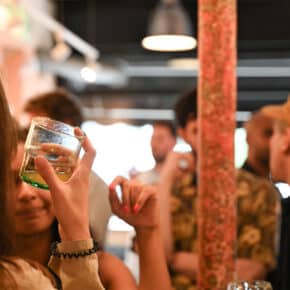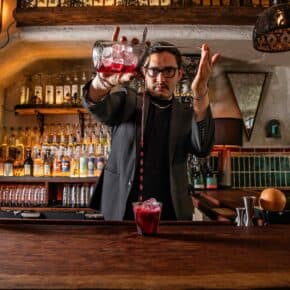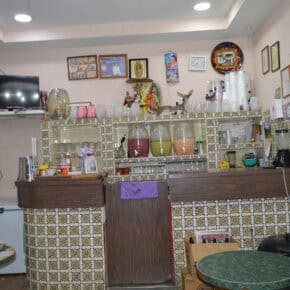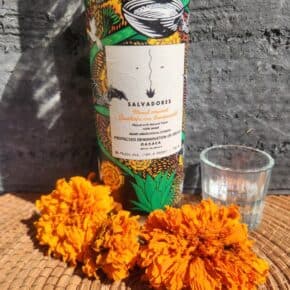How do we begin to tackle the subject of 2020 and the toll it has taken on all of us in the mezcal industry? While the holiday season is normally a time for reflection, this year presents us with some exceptionally heavy thoughts. We’re still in the middle of a pandemic which has wiped out the bar and restaurant world globally. Most everyone behind bars is out of work or struggling along mightily. Producers continue to make mezcal but the toll in Mexico feels underreported at best. And the conduits between maker and seller are all completely scrambled. And that’s just the present: Theories abound about what the new normal will look like. We have months before we’ll get any clarity. So, what better time than now to check in with the mezcal world for their thoughts on the the year. Their thoughts follow.
Clayton Szczech, founder of Experience Agave
Crisis really brings out people’s true colors, for good or ill. That was definitely the case this year. So many people reached out in solidarity to make sure that folks here in Mexico had what they needed to get by. And obviously, people in many roles all over the world have been making huge sacrifices for the greater good.
At the same time, we’ve all seen at least as many examples of sickening selfishness. In the Mexican spirits context, I’ve dealt with multiple parties trying to take advantage and pick the bones of struggling and failing businesses, engaging in predatory speculation and price gouging.
So, just as we’ve seen the best and worst in people on display globally, the world of agave spirits aficionados has been no different. It’s a good reminder to pay more attention to what folks do than what they say. In general, human behavior this year does not make me hopeful for our collective chances in the face of climate change and other looming human-created catastrophes.
Shad Kvetko, co-owner of Las Almas Rotas Restaurant and Bar
2020 started off looking like it would be the year for Las Almas Rotas. We had experienced almost unheard of year over year growth since opening three years before, we had just hired an executive chef to elevate our food program and were the first bar in Dallas to receive a James Beard nomination for Best Bar Program. In February we experienced a catastrophic flood that wiped out everything we had in savings and in March it all came crashing down due to Covid. We had decided to voluntarily shut down one day before Dallas county enacted their ordinance closing down on premise dining, which was the first day our new chef was supposed to start after returning from his honeymoon in Mexico. Instead of the coursed dinners and spirits pairings we were planning, in two days we pivoted to a to go only food program. Ironically, none of us had wanted to do food service in the beginning. We were forced to because our landlord had built out the kitchen with tenant improvement money for the previous occupant and it was required by our lease. Little did we know that it would be the thing that saved us from having to close down entirely. So we launched “Las Almost Rotas”. We decorated the alley next to our building with strands of papel picado and colorful signage which reflected our brand. We not only wanted to give people a great product, but also a little of the experience of coming into our bar. We were able to continue on about 10% of our normal revenue for the next several months.
We also enacted a virtual tasting program via a private group of friends and trusted customers on Facebook where we hosted some of the top names in Mexican spirits for those who purchased flights. These were always interesting, often hilarious and turned out to be a real bright spot in an otherwise bleak time for us and I will be forever grateful to those who dedicated their time to help us out. It also helped to give us all some of the communal experience that we love in the world of mezcal. As we look ahead to the coming new year, things don’t really seem to be looking up for our industry. We’re coming into the winter months which will kill our patio service, and our dining room is small even without having tables spaced apart according to CDC recommendations. As people continue to lose their disposable income, fewer and fewer will be able to support the places that they have in the past year. I really don’t know what the future will bring for our little place. The food and beverage industry is brutal even in the best of circumstances, let alone with a global pandemic, riots and other unrest. I can only hope that we remain safe and healthy so that even if this dream dies, we can live to dream another.
Camille Austin, Director of Advocacy at Casa Lumbre Spirits
It’s hard to believe that just a year ago we had gigantic plans, dynamic events and loads of travel to Mexico and beyond in the pipeline. Aside from the enormous challenges this year has brought us, for many it has also made us stronger, smarter and more in tune with what really matters. With the on-again, off-again closure of local restaurants and bars, the biggest shift in business model that I’ve seen from brands is the rapid launch of smaller SKUs like 200ml flasks and 375ml bottles. With bringing these presentations to the forefront, particularly with mezcal, spirits are offering consumers an opportunity to taste delicious or even rare elixirs at home without breaking the bank on a larger bottle they might not go through as quickly. Not only are the smaller presentations incredibly accessible, they are great for holiday gift shipping in a year when we might not be able to reunite with loved ones.
E-Commerce and digital advocacy have also become essential parts of the spirits business this year. Paid media, e-commerce and virtual events might currently equate to mezcaleria back-bar visibility. And as the marketplace becomes more familiar with canned or bottled cocktails and RTDs, my wish for 2021 and beyond is that we keep this fun trend alive the right way, by using quality spirits and ingredients, and supporting local businesses. Although this year has been very unexpected by all accounts, my hope is that the industry continues to reinvent itself and that the great relief and charity work being done by local organizations like No Us Without You in LA, Another Round Another Rally, and many others continues to be highlighted and supported.
Darinel Silva, mezcal guide
I was afraid for all my Mezcalero friends at the pandemic beginning, what was coming it was uncertain by that time. Later messaging with few of them ( small producers ) they said it was relaxing !!! It gave a pause to them on the mezcal making, kind of “go slow with the mezcal making” especially with rainy season coming and being able to take their time for working on fields planting agave, corn, beans, vegetables and attending the farm animals . So for some of them, even if it was difficult financially, it allowed for a restart and a balance on their “rush for making mezcal”.
Ivan Vasquez, owner of Madre Restaurants
Opening a restaurant bar in the middle of 2020 is something that I will remember for the rest of my life. My American dream was disappearing as my two restaurants were shut down, we lost 90% of our income, and savings were depleted trying to rescue the business and opening the third location.
Opening the new restaurant has been one of the biggest challenges in my life and now we are stronger than ever. If we stay in business after the pandemic, we can say it is the biggest accomplishment for me and the team.
Sabrina Lessard and Gabriel Velazquez Zazueta, owners of TUYO NYC
It’s hard to believe we have made it this far! Like most folks, we scrambled and definitely fumbled in the first few weeks and months of the pandemic. TUYO was in the middle of promoting our first Maridaje event when we went into lockdown. It was quickly postponed indefinitely. With every week that went by we were more on edge and scared for our friends in hospitality, frontline workers, and most of all our undocumented friends. Conversations turned dark really fast. Gabriel and I began brainstorming with friends about what we could do to help support our community. We obsessively checked the news and became dependent on our devices to communicate anything and everything. Can we pause for a moment and reflect back on all the IG lives that pretty much EVERYONE was doing – that was a crazy few months! It goes to show how much we want to hear and see each other. In our home, the Conversations in Agave Series became a much appreciated Monday night ritual.
We figured out how to record remote conversations for Hey Hey Agave to keep contributing to the mezcal community we love so much. We invited a diverse group of people from the States and in Mexico and covered a range of topics from mezcal history to the importance of preserving indigenous languages. In February we initiated a project that took almost the entire year to develop, manufacture, and launch. Patience is not for the weak of mind, heart, or spirit. Cosmovision is a collaboration that came together in such a beautiful, slow, and organic way and we are super proud to be able to share it with everyone. It combines all the elements we love; art, agave, and mezcal culture!
As our worlds grew smaller we found new digital channels of support. Participating in group video chats, snail-mailing each other care packages, and contributing to go-fund-me campaigns. We learned what to tune in and tune out. We learned how to mourn remotely while being united together in a global cloud of grief. We lost a family member to COVID. We lost a friend to cancer. Babies were born and weddings were zoomed. All the while we did our best to keep moving forward. Our society experienced a collective call to action. A battle cry to unite and fight for Justice. BLACK LIVES MATTER. We have been given the opportunity to change, grow, adapt, and survive. If there were any doubts before they have been dissolved through all the lives lost, tears shed, hands and hearts held close. We are in this together. With a little luck and a lot of mezcal we will continue to walk this long strange road together, at a distance for now, but definitely with copitas in hand.
Fabiola Santiago, founder of Mi Oaxaca, a project focused on Oaxacan food and culture with an educational lense
So many variables are leading me more toward mezcal. But it’s an area I’ve avoided because of the industry’s complexities and because there’s so much familia heartbreak, being that many of my relatives produce or once produced mezcal. So I’ve been taking more time to imagine a different industry. This is what I believe normal in the mezcal industry can and should look like:
The mezcal industry is asking too much of the land and people, and it can result in climate change migration and more family separation. I believe that it is wrong that mezcal producers give the world mezcal while our communities are often forced to make decisions that we are then vilified for. So I want us to promote and protect producers who are protecting the ecology because this’ll help curb climate change migrants. I want people who love the spirit to first ask how they can use their privilege, positionality, and power to be of service to the communities. I want mezcal producers to have the agency to travel to all the countries where their spirit is available, if they want to. I haven’t heard of anyone helping in this area. We need more people who are willing to be of service, and less people who just want a brand and profits. Because if we want to continue having the quality mezcal that was inherited by mezcal producers from our ancestors, then we have to also protect the people and the communities where it’s produced.
Misty Kalkofen, mezcal educator
This year has been hard in countless ways, but it also came with many lessons. Even though I work full time for a supplier in the Mezcal space now, I still feel so close to my brothers and sisters in the restaurant industry and it has been so painful to feel so helpless as they have suffered these least nine months. Early in the pandemic Kirsten Amann and I interviewed Bobby Heugel on our podcast and he laid out what I think is the most important lesson for the hospitality industry which is that independent restaurateurs need to organize and be politically active. Organizations like the Independent Restaurant Coalition need to exist not just in times of strife. We need to always be advocating for our industry and its workforce, not just organizing as a reaction to events. The pandemic has laid bare serious, systemic issues and only consistent engagement in the political process will make the changes necessary to make this a healthier, more equitable industry. Bobby Heugel 2024!
Danny Mena, chef, author and partner with Mezcales de Leyenda and Peloton de la Muerte
I think the most important attributes that humans have (besides the opposable thumb) is our ability to reason as well as our ability to adapt. And this year has proven to be a year where we need to dig deep on ingenuity and adaptability.
The restaurant model was fucked (at least in big cities), and we knew it, but we kept on going along with it. And this pandemic has forced us to change. Some restaurateurs have gotten lucky, or have shown ingenuity (or both) and they have made the best of it, some have had bad luck and weren’t able to. As we look forward to next year, the landscape will be very different. If we are lucky enough to be around, as restaurateurs, then this might be a time to really look at the models and make sure they function for all, and not just for the landlord or city.
We are social creatures that have all agreed that alcohol is an essential item, and we on the liqour/restaurant front are essential workers. So hopefully customers, buyers, landlords, and the federal government will be more supportive of what we do.
Though the hospitality industry is a ball breaker, I love it, and what makes it all worthwhile is a customer that appreciates what we do, what they ate, what they drink (it ain’t easy to make a good mezcal!). And so hopefully as customers return to eating out, they will appreciate that we provide a service that we do out of love (for the most part).
Though I fear we will quickly revert to our old ways and just forget 2020 ever existed and will become one of these legends about the great pandemic…
Susan Coss, co-founder of Mezcalistas
Like everyone in the world of hospitality, I am a people person, which is to say my energy, and revenue source for Mezcalistas, comes from the ability to interact face to face with people. Pushed into a virtual world, with screens our only way of “seeing” people. My household is full of three extroverts and each week of shelter in place took its toll on us. My dreams, usually black and white and quickly forgotten, became scenes of technicolor. I went to concerts, danced myself silly with friends who live on the other side of the country. Other times I would be dining with friends who had passed. I was a pirate sailing the South Pacific, a torch singer for hire, though failed my first big gig by passing out before the show even from pain medication I had been prescribed for surgery I had the previous day. I rode point on a cattle drive across Montana, refurbished a house I bought in Mississippi and put together a new business concept for a restaurant chain in Hungary.
And then in the fall, as the days grew shorter, my dreams took a darker turn. I woke up one night pounding my pillows screaming no no no, my heart racing, covered in sweat. I kayaked down a calm river, turned a bend and then careened over a waterfall. This would be the theme for several weeks, falling from a plane, over the side of a bridge, the bungi cord wrapped around my ankle suddenly snapping. I fell out of a window into a cart pulled by horses running down a hill that never ended. I stepped off a cliff at the Grand Canyon. There was never a bottom, or an end to these falls.
When my sister passed away and the enormity of her loss and the responsibility I was taking on with raising my nephew began to hit, my mother and I would pass each other in the hallway at night, neither of us able to sleep. We whispered words to each other, this too shall pass, we will be fine, there will be light at the end of the tunnel, mantras we repeated for years until eventually we adjusted to a new level of fine and the horror of those early weeks and months did eventually pass.
How will this time of Covid be documented, how will we view this in the years to come? Will we do as our forebears did with the Spanish Flu, acknowledge it happened, that lives were lost, and then move on, never to speak of the damage done, focusing only on the job we have done pivoting our way into the future?












Leave a Comment